Parks & Recreation
First Day Hikes, ParkPasses and More at Georgia State Parks and Historic Sites
Published
3 years agoon

Welcome 2022 with a First Day Hike
This New Year’s Day, join our park rangers for an inspiring First Day Hike. More than 40 guided treks let you connect with nature, friends and family. Outings range from a kid-friendly stroll through Mistletoe State Park’s campground, a three-mile hike through Georgia’s “Little Grand Canyon,” and even a night hike at Reed Bingham State Park. (Some are even dog friendly.) Find the perfect First Day Hike for you. Want incentive to keep hiking? Join our Canyon Climbers Club quest.
Explore More in 2022
Where will your boots take you in 2022? Our newly published “Guide to Georgia State Parks & Historic Sites” is available in park offices or by calling 770-389-7286. The booklet is filled with ideas for spring break, romantic retreats, weekend outings and summer vacations. Do you visit often? Save money with an Annual ParkPass ($50) that provides parking at more than 40 state parks, plus the Historic Site Pass ($25 – $50) that covers admission fees at 15 sites.

New scratch-off posters and passports let you track your travels across Georgia, from Amicalola Falls in the mountains to Wormsloe near the coast.
Prescribed Burns Benefit Ecosystems
You’ve heard “good fires prevent bad ones,” but do you know how experts plan for them? Our latest blog post examines what goes into using prescribed burns to restore and protect Georgia’s ecosystems. Experts use prescribed fires to stimulate the growth of herbaceous plants like wildflowers and grasses, which are the foundation of a healthy wildlife ecosystem. Wildflowers are crucial for pollinators like moths, butterflies and bees, and their health has impacts up to the largest animals, such as bears and deer.
George T. Bagby State Park
Good news, campers! George T. Bagby State Park in southwest Georgia is now operated by the Department of Natural Resources. To best serve guests, plans are underway to replace the lodge with traditional state park amenities such as camping. Cottages and the group shelter will be improved as well. Visit soon to enjoy a meal in the restaurant, play a round at Meadow Links Golf Course, and go fishing and boating on Lake Walter F. George.
Upcoming Events
Meet the Farm Animals, General Coffee State Park, Douglas – Fridays and Saturdays in January
Eye Spy Scavenger Hunt, F.D. Roosevelt State Park, Pine Mountain – Saturdays in January
Colonial Medicine, Fort King George Historic Site, Darien – January 2, 16, 22 and 30
Archery Class, Magnolia Springs State Park, Millen – January 8 and 22
Movie Night, Laura S. Walker State Park, Waycross – January 21
Living With Bears, Smithgall Woods State Park, Helen – January 22
Find more happenings on GaStateParks.org.
Look Who’s in the News
Northwest Georgia News – Georgia Parks, Historic Sites Offer Inspiring Adventures to Kick Off the New Year
Southern Living — The Best Stargazing Spots in the South
WSB TV Atlanta — White Christmas, cozy stays, holiday hikes on tap at state’s best kept secret
365 Atlanta Traveler — Gift the outdoors: Georgia State Parks Holiday Gift Guide
MSN Travel — Jaw Dropping spots to park your RV
LoveExploring.com — Your state’s most beautiful natural wonder
Related
Parks & Recreation
A Look at Simpsonwood Park’s Past and Plans for Future Development
Published
3 months agoon
February 12, 2025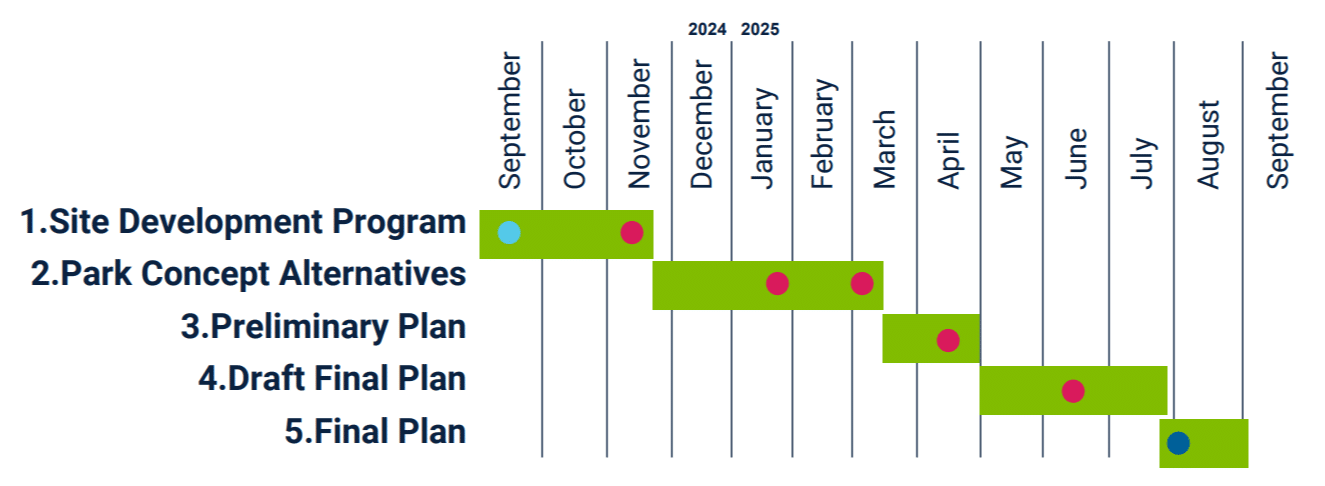
Source: Peachtree Corners Post 2 Councilmember Eric Christ’s recent newsletter.
The Simpsonwood Park Citizen Steering Committee met again in January and reviewed three concept alternatives presented by the Gwinnett County Parks Department. There was lots of voting by the committee members on the various potential plan elements, as well as input from the general public during the public comment portion of the meeting.
Overall, the plans continue to move towards passive and natural uses — more than in the 2016 plan and far more natural when compared to the 700-person conference center and recreation facilities operated by the Methodist Church from 1985 until 2014 at that location.
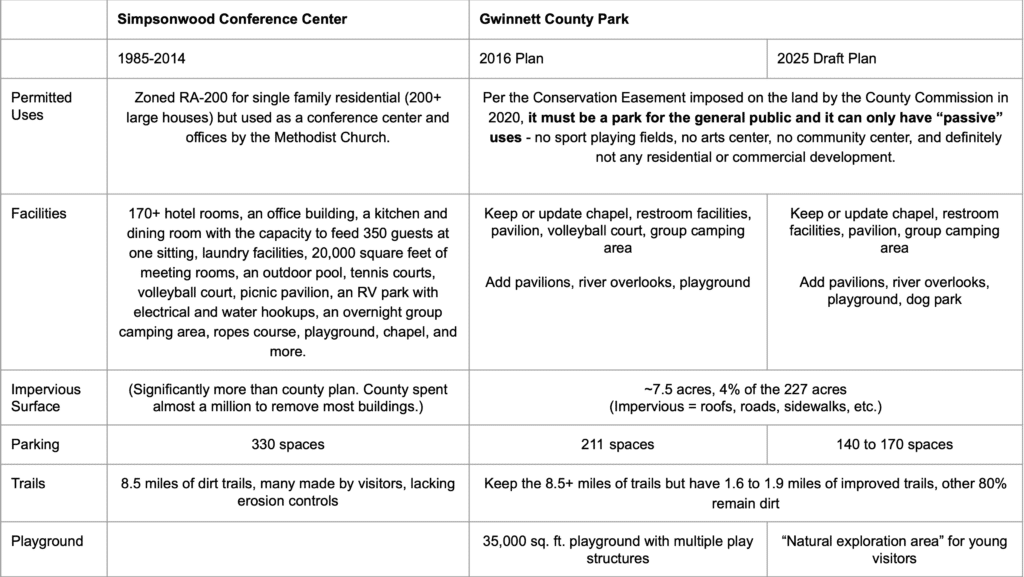
- Buildings — after the purchase, the county spent almost a million dollars to remove multiple buildings with 170+ hotel rooms, an office building, a kitchen and dining room with the capacity to feed 350 guests at one sitting, laundry facilities, 20,000 square feet of meeting rooms, an outdoor pool, tennis courts, an RV campground and more while retaining the chapel, a pavilion, a sand volleyball court and an aging restroom building. The draft 2025 plans add or update restroom facilities, one or two pavilions and river overlooks.
- Impervious surface — the total of the land that would have an impervious surface (think anywhere that rain can’t fall directly on the ground such as roads, roofs, sidewalks, paved parking areas, etc.) would be about 7.5 acres under the 2025 draft plans. This represents about four precent of the 227 acres and is significantly improved from when the Methodist Church had many buildings on the property.
- Parking spaces — there were over 330 parking spaces on the property when the county purchased the conference center. The 2016 County Plan called for 211 spaces. And the draft 2025 plan recommends even fewer spaces, between 140 and 170 total spaces.
- Trails — to increase access to the park for the disabled and for parents with strollers, the draft plans call for 1.6 to 1.9 miles of improved trails, but the majority of the ~8.5 miles of trails in the park would remain dirt.
- Playground — in 2016, the county had a baseline requirement that every county park must have a traditional playground for younger visitors. While there was a small playground on the property when it was a conference center, the 2016 plan called for a new 35,000 square foot playground with a variety of play structures. As of 2025, a traditional playground is no longer a county requirement, and the draft plans have a “natural exploration area” for youngsters instead.
- Dogs and a potential dog park — The number one complaint I hear from Simpsonwood Park visitors is dogs being off leash. While keeping your dog on a leash and picking up after them are already park rules, apparently some dog owners treat Simpsonwood Park as a 227-acre dog park and have gone so far as to tell other visitors “if you don’t like dogs running up to you, you should probably not come to Simpsonwood.” This is obviously unacceptable. It’s a violation of the park rules and disrespectful to other visitors. People should not have to carry mace spray to protect themselves from unleashed dogs in the park. Nor should hyper vigilance be required to avoid stepping in a pile of dog waste. It may seem counterintuitive, but some dog park advocates are saying that having a small, fenced area specifically for dogs within Simpsonwood Park will make it easier to enforce the “dogs must be on a leash” rules throughout the rest of the park.
Next steps
Once the Steering Committee completes their work later this year, the proposed plan will be reviewed by the Gwinnett Recreation Authority. You can share your thoughts with the Authority board members here.
You can find links to Councilmember Christ’s social media pages or sign up for his newsletter at linktr.ee/votechrist.
Peachtree Corners Magazine reported on the most recent Simpsonwood Park community meeting. You can find that article online here or in the February/March issue.
Related
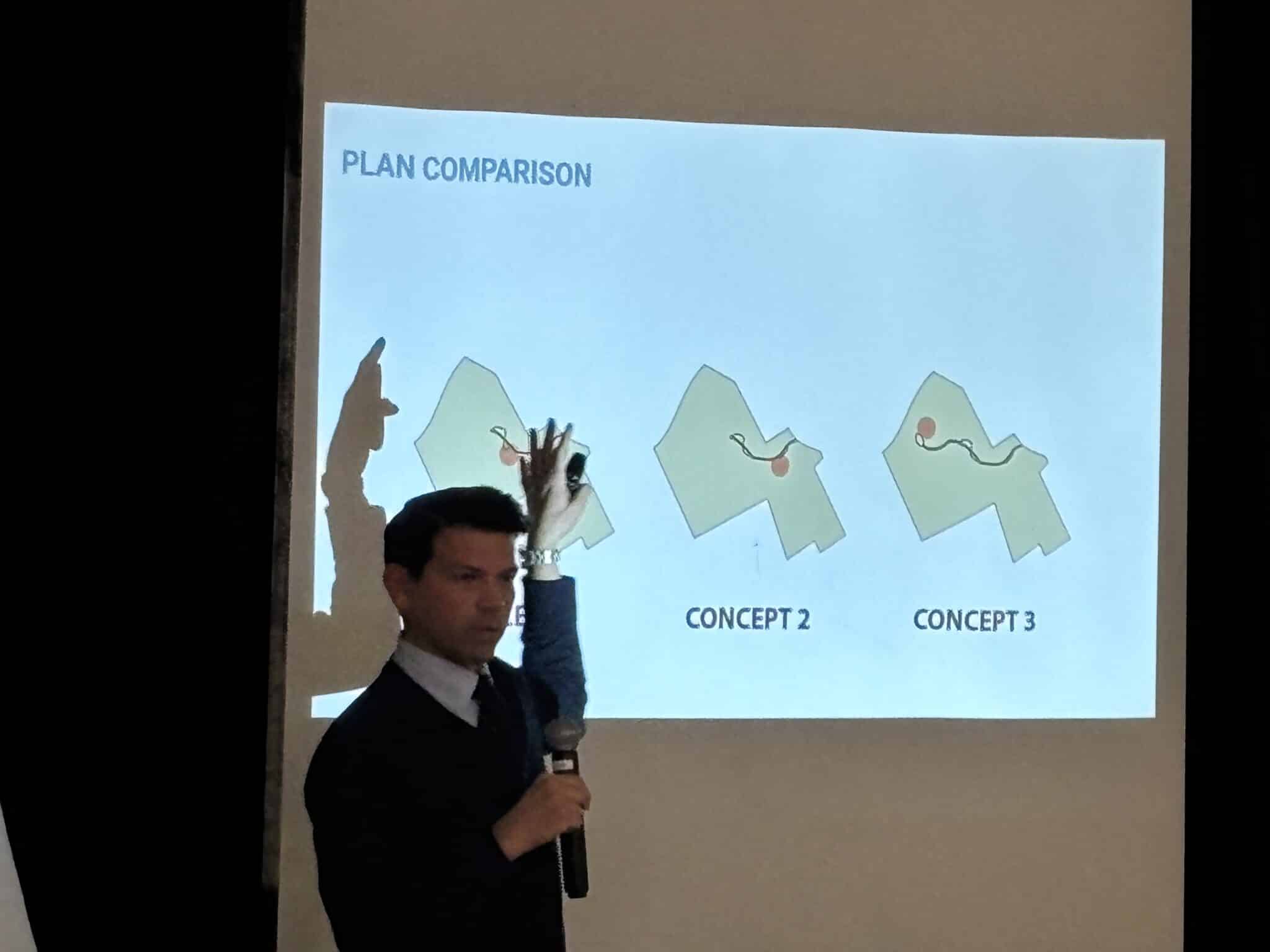
Citizen Steering Committee continues redesign plans with many residents against any changes
The second meeting of the Citizen Steering Committee for the Simpsonwood Park Master Plan took place on January 15 at Pinckneyville Community Center and focused on a presentation and discussion of three conceptual plans.
- Concept 1 centered on a central hub
- Concept 2 centered on an eastern hub
- Concept 3 centered on a river hub
According to Carlos Perez, president and founder of Perez Planning + Design, LLC (PP+D), a research-based firm contracted to facilitate the park redesign, key features for each include vehicular circulation, parking areas, multi-use paths and program areas like dog parks and nature exploration zones.
Perez added that the plans aim to balance natural resource protection with recreational needs, emphasizing ecological management and sustainable trail systems.
The committee emphasized the importance of community input, particularly on the balance between parking spaces and natural areas, as well as the need for clear communication with county leadership.
Concept 1
- 100 paved spaces
- 40 overflow parking spaces
- 1.9 miles of paved trails
- 5.7 miles of hiking trails
- 7.3 acres of impervious area
“The idea is that we have this existing road that would be improved, but done in a way that preserves that feel of a natural park,” said Perez.
He added that all of the models will have an access road to the Wood Creek pump station. The Department of Watershed Resources must be able to get vehicles and equipment in for maintenance and repairs. It wouldn’t change much from the existing road. However, in certain areas, the road will need to cross streams and creeks.
“We would do that with a wood bridge consistent with the character of the site,” said Perez.
He added that much of the parking will be near an area being called the Great Lawn. There will be additional parking near the chapel, with an overflow parking area of 20 to 30 spaces for events that may take place in the park.
“It will be done in a way that’s paved but integrated as cleanly as we can within that environment,” said Perez. “The overflow parking would be a green space area that, when parking is not there, then it just looks like an open field with trees around the edges.”
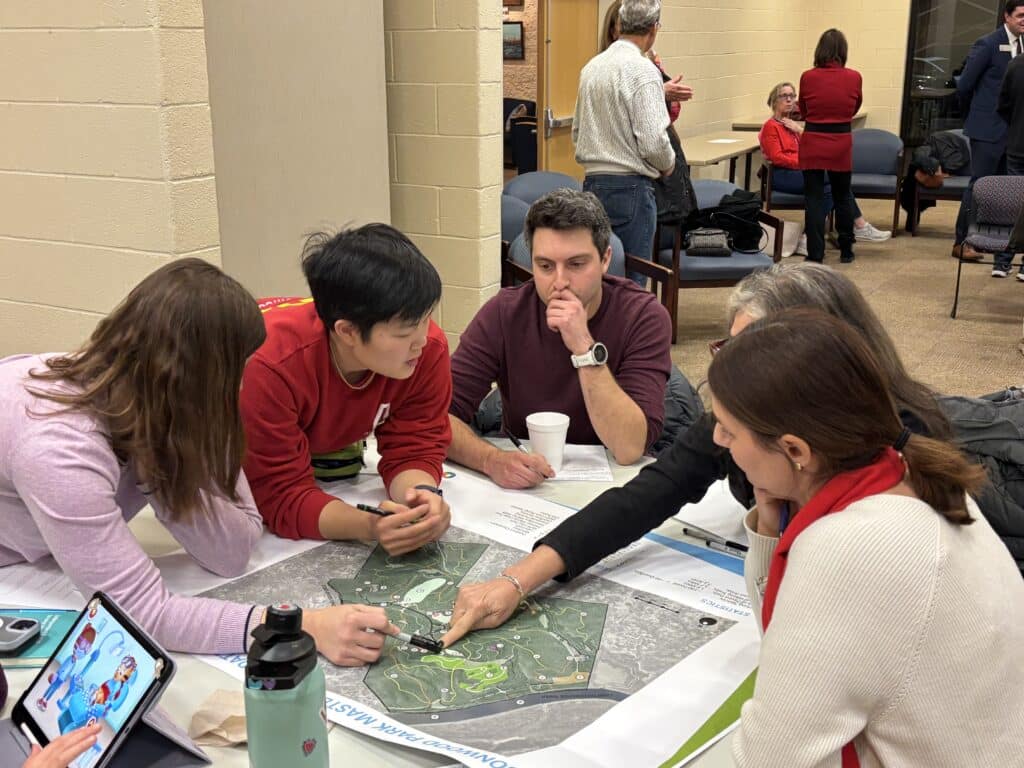
The primary multi-use paths are consistent with what’s currently in use at other parks throughout the county.
“The idea is to look at a potential two loops, one that’s about a mile and one that’s a little longer — 1.5 miles — going around a portion of the site and then connecting back to Jones Bridge,” he said. “Then there is the accessible access path from the parking areas and from the hubs with sidewalk connections that connect the paved, multi-purpose trails to the different hubs that are located in this area.”
Perez added that there will be boardwalks to cross over wetlands, creeks or streams as needed. There would also be some small pavilions — a larger one in the central part, near the chapel and two smaller pavilions.
This concept has the potential for a light camping area. The Great Lawn could serve as an outdoor classroom. There’s also a nature exploration area and space that could be a dog park. Perez also mentioned two overlooks along the river with a restroom nearby. This plan calls for a restroom near the central area and another near the chapel as well.
“There’s also a secondary hiking loop and connector trails that happen throughout the park,” said Perez. “These would be very natural in appearance, not improved.”
Concept 2
- 90 paved parking spaces
- 65 overflow parking spaces
- 1.67 miles of paved trails
- 6.6 miles of hiking trails
- 7.1 acres of impervious area
“Concept number two looks at moving the hub closer to the road,” said Perez. “We’re calling it the Great Lawn hub.”
He added that, similar to the first plan, this one has an access road to the pump station and also access to the cell tower. There will be parking areas near the Great Lawn, a campground area and near the chapel.
“We have a slightly different orientation of the multi-purpose trail, including one that circles on the edges of the Great Lawn and another one that circles around the middle area, one a little closer to the overlook and then a connection to the road.”
Another difference is an area with walkways near the chapel, an interpretive, accessible path area and more accessible boardwalk.
“In terms of the structures, we have some of the existing chapel, a large pavilion and two small pavilions near the chapel,” he said. “There will also be a restroom or a maintenance building in that location.”
This model, too, includes an area for a dog park, a nature exploration area, a campground in the Great Lawn area and a meadow. There will be primary hiking and secondary hiking loops that circulate throughout the site and connect to walking paths.
Concept 3
- 130 paved parking spaces
- 40 overflow parking spaces
- 1.75 miles of paved path
- 6.5 miles of hiking trails
- 7.4 acres of impervious area
“We’re calling concept number three the river hub,” said Perez. “This concept shows that main entrance road going a little farther into the site near the river. And this was in response to those river experiences and trying to get accessible locations closer to the river, to get people to the river.”
The river hub would include paved parking and overflow parking. There would still be parking near the chapel. This model also includes picnic areas. The plan has a one-mile, multi-purpose loop and another half-mile loop that connects to the road and accessible paths.
The model has two large pavilions, four small pavilions and the chapel. It also includes a labyrinth, a natural play area, a dog park and a camp ground.
Committee and community feedback
The committee members who were present all consistently agreed that Concept 3 was their least preferred plan. Although they had concluded in the November meeting that they didn’t want a dog park or a playground, some form of both were in all of the designs.
They were also lukewarm on the camping component, arguing that people looking for a place to smoke marijuana, drink alcohol and do drugs were more likely to use the facility than any scouting groups.
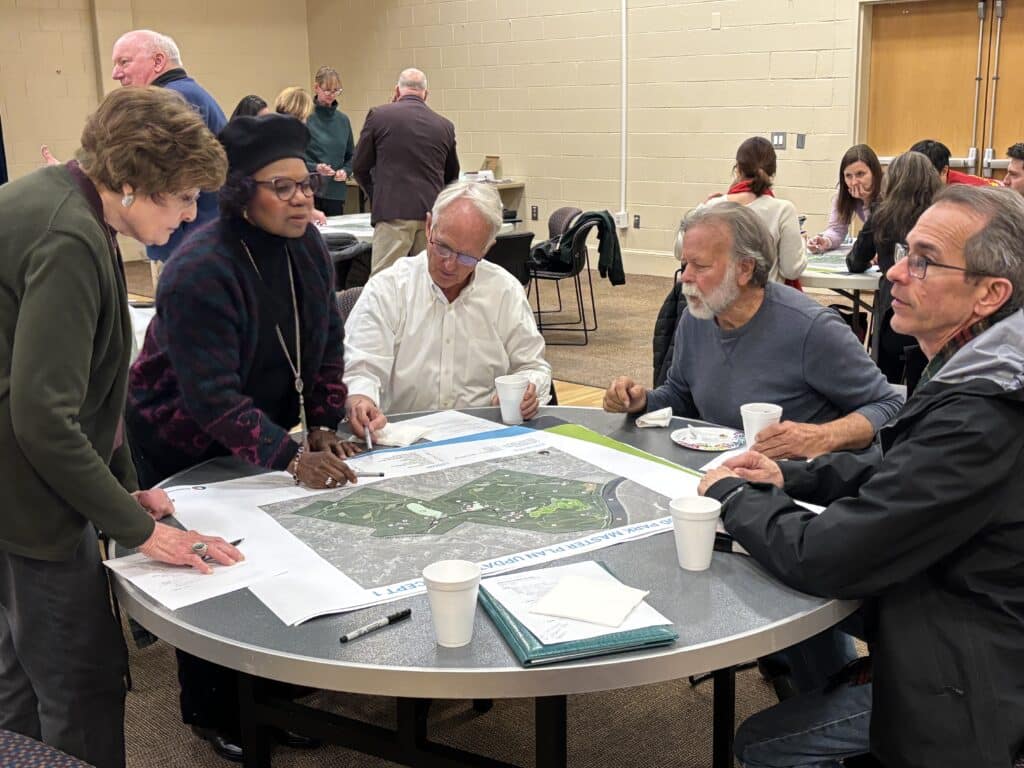
Some were against any paved paths at all — even though that would limit access for those with disabilities or families that needed to use strollers. And just about everyone wanted to see fewer — not more — pavilions.
Preferences leaned towards Concept 1 for its main area layout and Concept 2 for its limited number of concrete paths. The community emphasized preserving the park’s natural state, citing environmental impacts and overdevelopment.
“I don’t know if y’all know there is a petition going around,” said committee member Danielle Leahy. “It has 1,200 people that [have] signed it that also agree. I’m just letting everyone know we are supposed to gather information, and that’s what I’ve done.”
Leahy said she isn’t satisfied with the way the Citizen Steering Committee is progressing.
“I found it disconcerting that features like the playground and dog park — that were completely nixed by the steering committee last time — were reintroduced on every single plan, nonetheless. The same could be said for the campgrounds, as they had less than 50 percent support at the first meeting, yet they appeared on each plan,” she said.
“Unfortunately, this sends the message to my group and the steering committee that our voices are ultimately not being heard. Gwinnett County seems to be pushing forward with their own hidden agenda no matter the opinions of the steering committee.”
Friends of Simpsonwood
Leahy founded Friends of Simpsonwood, a group of concerned citizens that largely want to see Simpsonwood Park remain pretty much as-is. She and about 50 members of the group attended the meeting. Dressed in red, they wanted to make it known that they were a strong voice in the community.
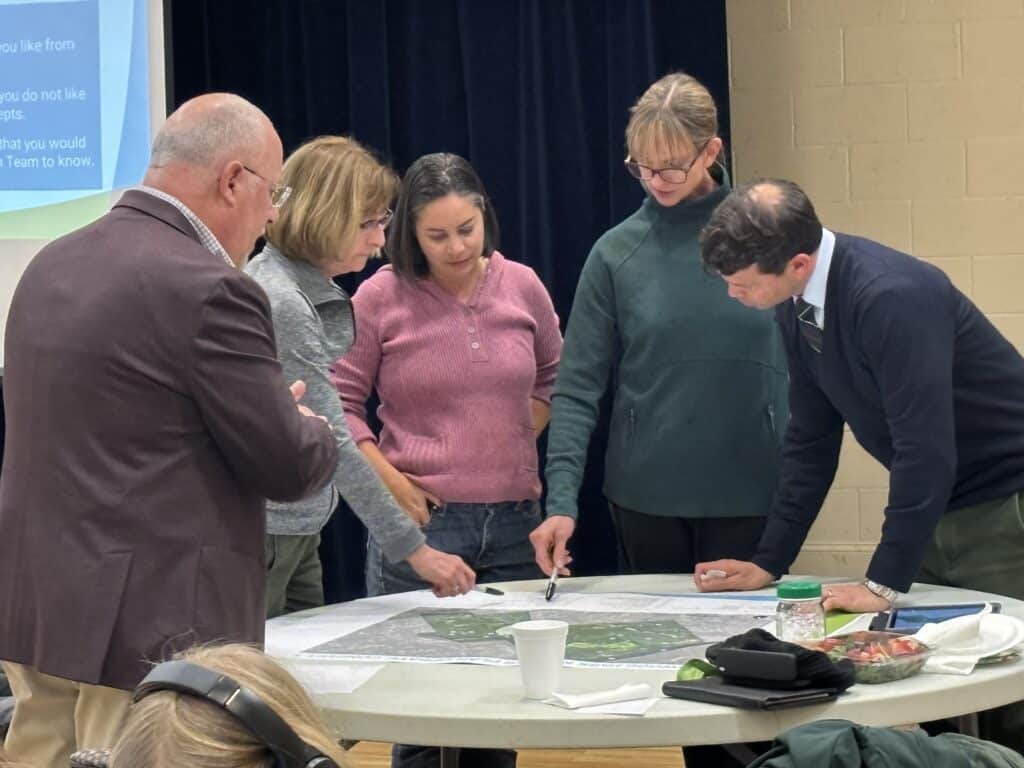
They had three main issues with the Citizen Steering Committee that were posted on their website. Peachtree Corners Magazine presented those complaints to Parks and Recreation Deputy Director Glenn Boorman. His written responses are below:
- The Steering Committee was quietly selected by Gwinnett County, with no transparency about why some citizens were selected and others were not. When asked at the Simpsonwood public meeting in September if members of the public could nominate and/or vote on members of the committee, Gwinnett County denied that request. Without full transparency about who is representing us (and why), we do not have fair representation.
Response: The attached slide was a part of the presentation at the November meeting explaining how the Citizen Steering Committee was established. Besides the original members that returned, the applicants were reviewed for location of residence (one was, in fact, not in Gwinnett County) to ensure an even geographic spread surround the area, review of recreation interests or activities looking for a broad spectrum of interests as well as community mindedness to represent the community.
- The Citizen Steering Committee is not allowed to discuss unwanted park features. During the November meeting, the members of the CSC were openly told that they are not allowed to discuss any features that they do NOT want for the park, only features they do want. This narrow form of discussion disallows real thoughts or opinions to enter the arena.
Response: There are specific activities and features which are not allowed on the property as dictated by the Conservation Easement. There are uses which are planned for other park locations. There is no need to have these items (such as active fields for sports and mountain biking) as part of the discussion.
- The Citizen Steering Committee does not have a vote. As of right now, there are no plans for the CSC to actually vote on any features for the park. As described by one official, the CSC is simply “an advisory committee” to Gwinnett County.
Response: This statement is incorrect, there [was] voting on features … at this meeting.
Public comments
The last 10 minutes of the meeting were reserved for public comment. The organizers allotted five speakers to have two minutes each.
Even though he doesn’t live in Gwinnett County, Malte Weiland works at the Peachtree Corners office of Siemens as a sustainability professional. He said he’s in the park about three times a week. He’s also been on the board of the Dunwoody Nature Center for eight years and said he’d be willing to lend any expertise to the park master plan.
“Our park has very similar constraints and also similar guiding principles to what I heard tonight, and we’ve got some semi-innovative ways that we approach that, particularly around our nature-based education and the long-term preservation of natural resources,” he said. “So if anyone’s interested in learning more about how we approach that and how we help this process, or maybe impact the design, I’m happy to meet with you more or just share that as well.”
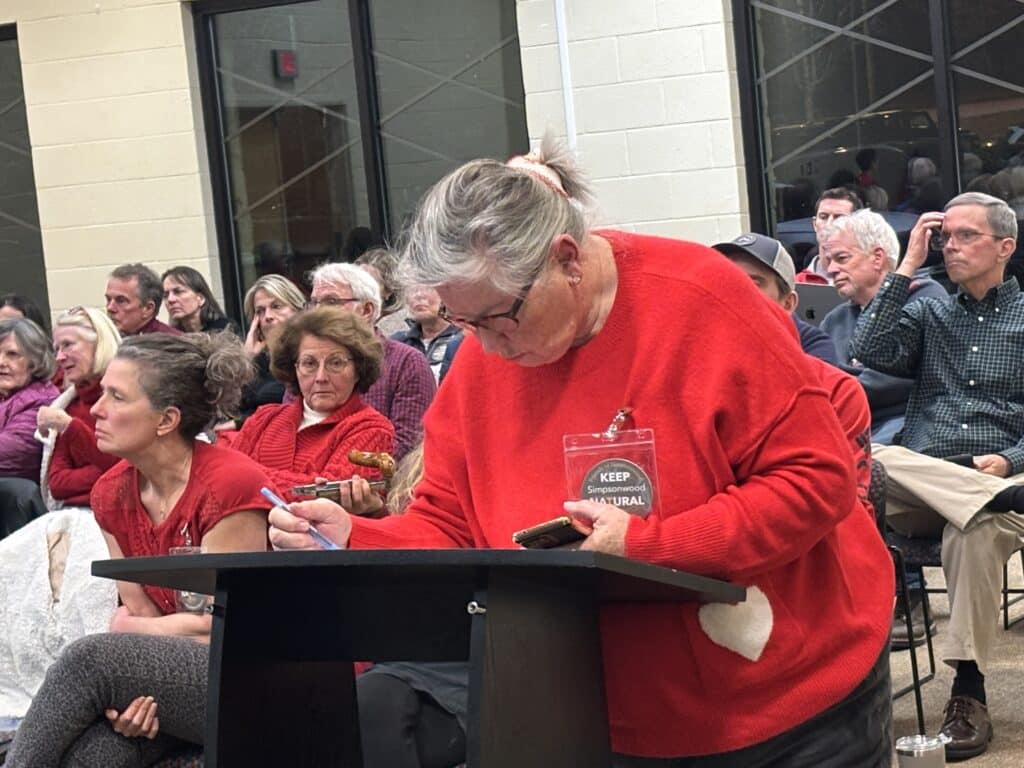
Debbie Mitchell lives in North Manor and is worried that proposed changes will negatively impact the quality of life for those near the park.
“My house is [to] the back of the church, so I’m very close,” she said. “My concerns are the environmental impact to the humans that live there, as well as the nature and the fact that you’re enhancing something and bringing more into an area of low trash, low light, low sound. I hear that there’s going to be events. And I don’t want to hear rappers in my yard, and that’s basically what it would be.”
She’s also concerned that the enhanced amenities will increase traffic and cause congestion.
“The roads have not been widened. They’ve not been prepared for a park that’s going to have events and have 200-plus cars,” she said.
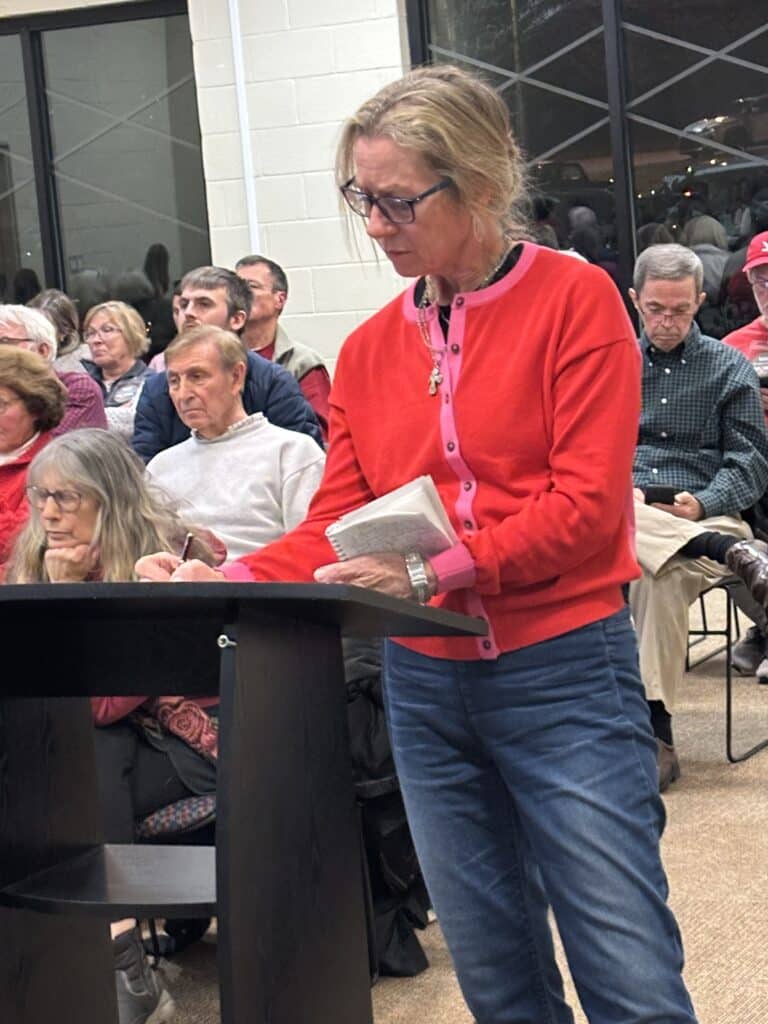
Pam Prehmus has lived in Peachtree Corners for 43 years. She remembers when it was mainly horse farms and natural greenery.
“Simpsonwood is unique. It is the only park where my daughter and [her] four children, as well as my other grandchildren that come to town, are able to hike in real woods, not man-made woods — real meadows— and play creatively without man-made logs put someplace,” she said. “You talk about preserving Simpsonwood, but you want to bring in more cars, more groups of people, which may actually exacerbate your problems that you’re trying to fix. This causes erosion, disturbances and affects public safety.”
The remaining speakers echoed similar concerns.
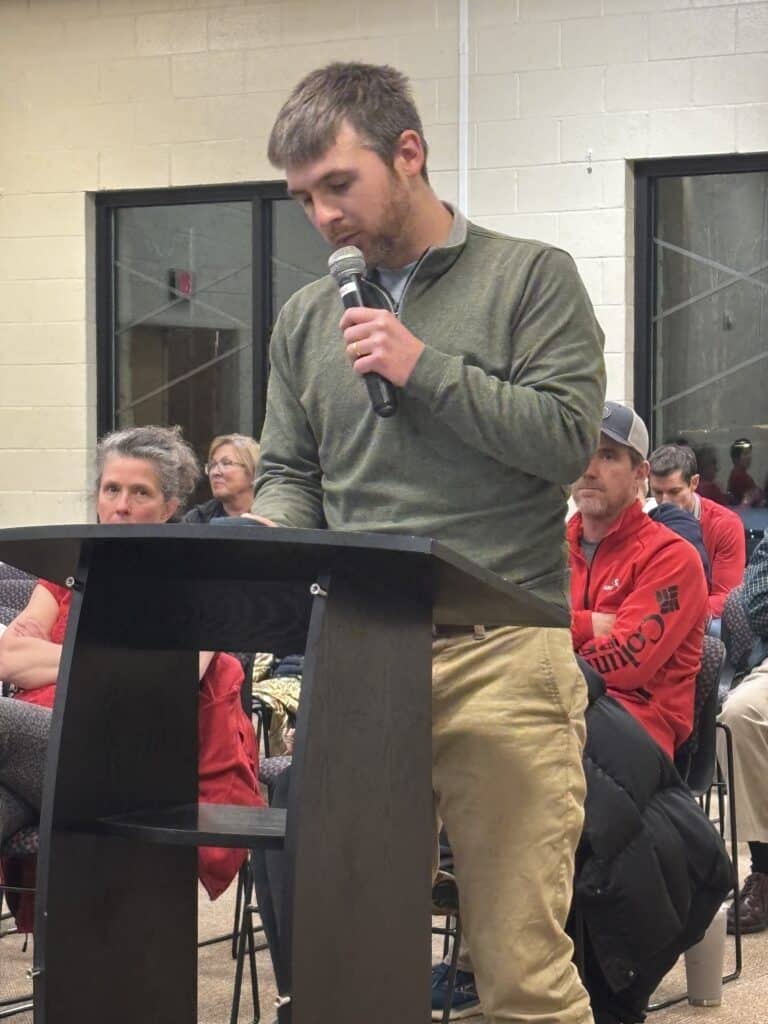
“This renovation goes against the three self-directed guiding principles set by this committee to address,” said Jack Head. “The watershed special protection area on the river has proposed items on each concept. … Those river overlooks would invite trash into the river. The parking spaces would clear cut trees. It would not be natural.”
Next steps
The committee had been scheduled to tour Simpsonwood Park, as well as two others in the county, but inclement weather caused the county to postpone the outing.
The next Citizen Steering Committee meeting is set for 6:30 p.m. on March 4 at Pinckneyville Community Center and is open to the public.
Photos credit: Arlinda Smith Broady
Related
Parks & Recreation
Latest Updates and Improvements at Jones Bridge Park
Published
4 months agoon
January 13, 2025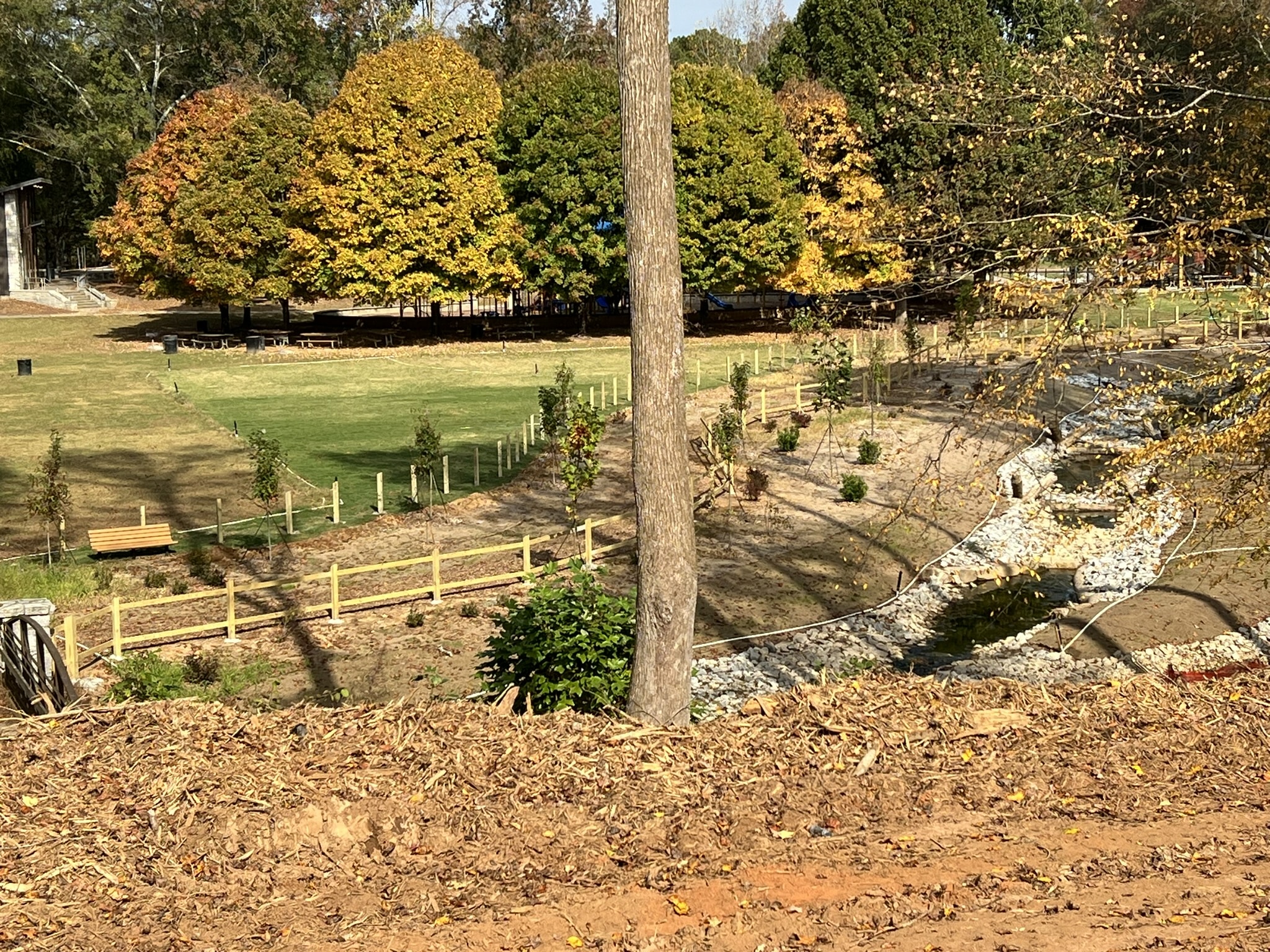
City and county officials met again with concerned citizens to discuss the progress of ongoing issues at Jones Bridge Park
In its online Best Parks guide, Explore Gwinnett lists Jones Bridge Park as the “best place to paddle.”
“Next time you have the urge to paddle, get your hull on the Chattahoochee via Jones Bridge Park in Peachtree Corners. Surrounded by trees and accented by shoals, this shady patch of river is a beautiful place to canoe, kayak, or set up a picnic. In addition to river access, the 30-acre park is also equipped with restrooms, pavilions, three soccer fields and a sand volleyball court. It is also a popular location for fishing and for admiring ducks and geese,” according to the organization’s website.
Nearby residents consider the popularity of the park a blessing and a curse with weekends and holidays crawling with unmanageable crowds. They point out that many visitors disregard posted rules for parking and littering. They’re also upset that, in their estimation, most of the overcrowding is due to people outside the area and the county encroaching on amenities funded by their tax dollars.
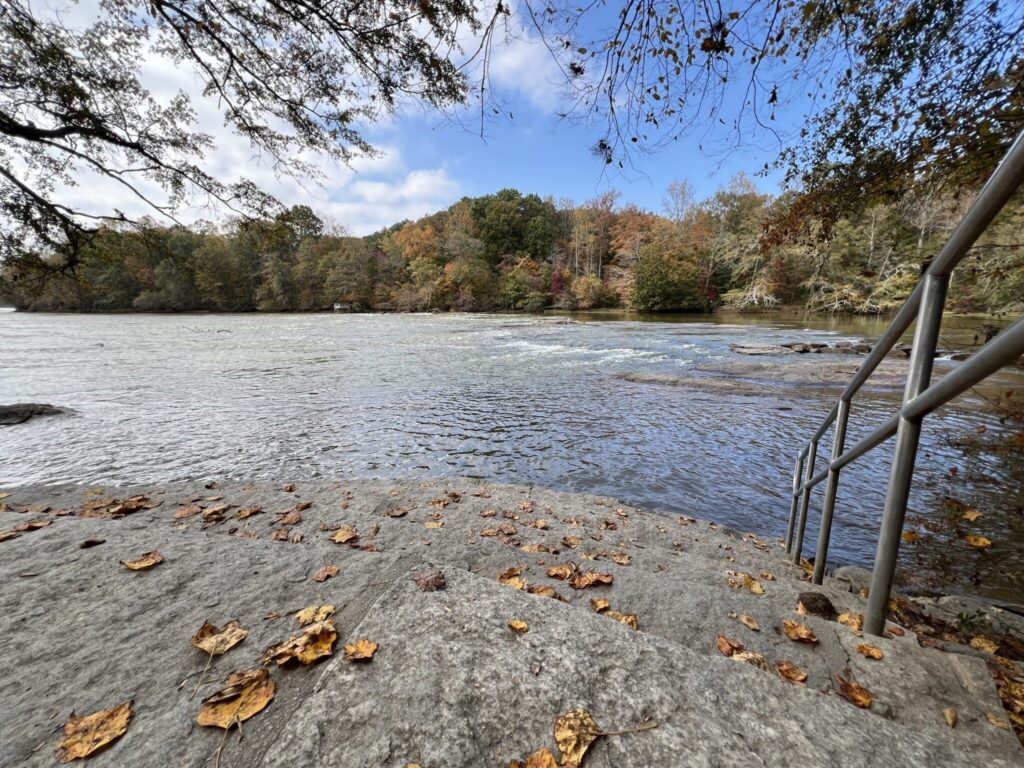
“I’m here today because just over the last four or five years, I’ve seen the gradual decline in the park itself,” said one concerned resident. “I mean, you go, it’s overcrowded. You got cars parked on curbs, and it’s just not a pleasant experience of what it was intended to be.”
Just about every one of the two dozen or so residents in attendance at a community meeting on January 8 at Pinckneyville Community Center agreed. The gathering was a follow up to two earlier meetings — one in summer and another in fall 2024 to address residents’ concerns about traffic, noise, unauthorized access, crime, upkeep and new projects at the park.
Park maintenance, future plans
The day before the meeting, Gwinnett County approved its budget for 2025. A key change was moving the Parks and Recreation Department to a stand-alone line item. It was previously part of the Department of Community Services.
With an allocation of $67,563,433 of the county’s $2.67 billion budget, the commission said there will be a focus on maintenance and repairs for parks and recreation through additional ground crews, vehicles and equipment to enhance residents’ experience at the county’s 47 open parks and facilities.
Delighted to share the news with the audience, Parks and Recreation Deputy Division Director Sarah Barlow offered a few key updates since the last meeting in October.
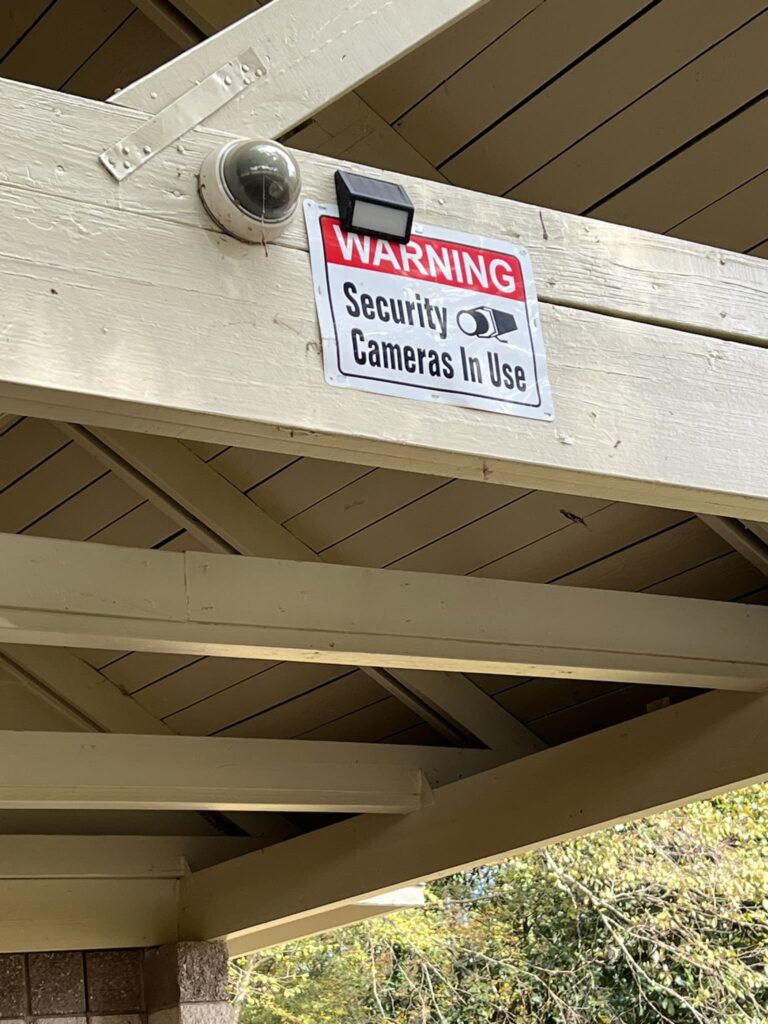
“I had the opportunity to meet with Seth Yurman, the assistant city manager with Peachtree Corners,” she said. “There are a couple of cameras that are potentially going to be donated, but unfortunately, it’s not that simple. This is government. So we do need an inter-government agreement. … And it turns out that we need internet in the park to run those cameras.”
Currently, there is no Wi-Fi set up in the park.
“That is not infrastructure we have in place at this exact moment in time, so we are working on [that],” Barlow said. “It is still very much in development, but we do not have those two crucial pieces in place just yet.”
Multiple park projects
On a more positive note, she announced that the stream restoration project is completed. Some attendees were confused at the news as there are still large pipes on site.
“The sewer project is still being worked on,” explained Barlow. “The park does still look rough. It’s two projects going on with our water resources.”
She added that once everything has a chance to grow in and fill out, it will be a thing of beauty. It’s estimated, however, that the sewer project may go on for another year.
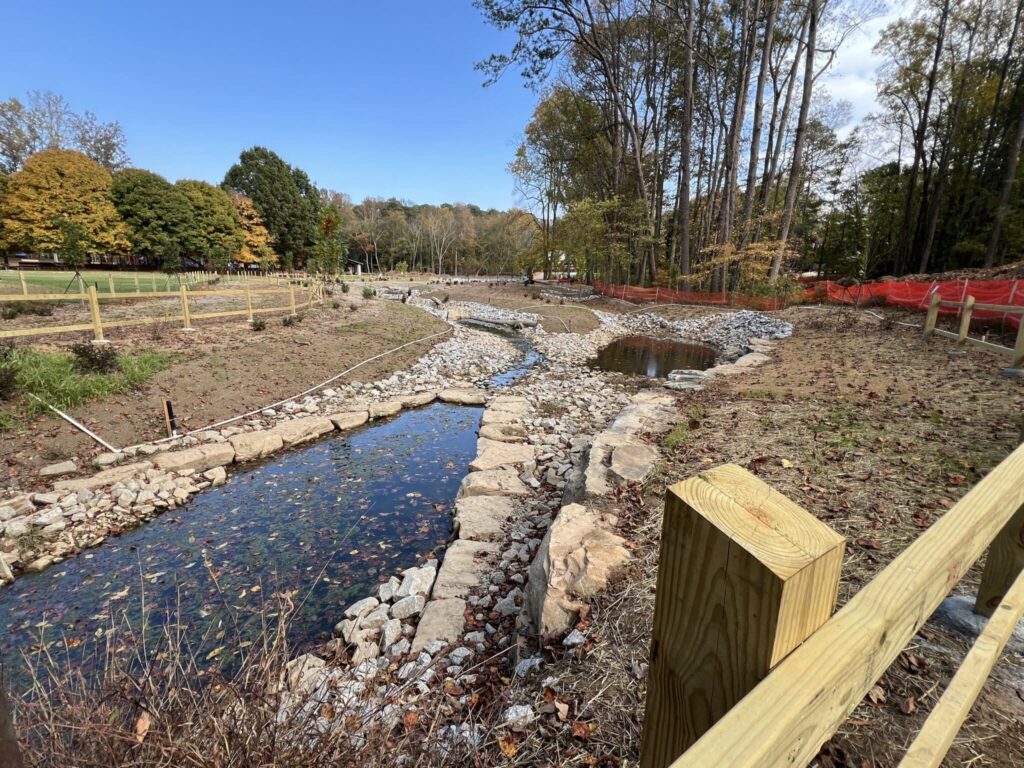
In addition to the sewer project and plans to add security cameras, Barlow shared that the plan to cut power to the pavilions during hours that the park is closed is also moving forward.
And she added that “Once everything kind of gets settled in and we get to be okay for finance to start spending, we will be green lighting the tree project at the edge of the soccer fields.”
“We’ll get those trees purchased and planted when the weather isn’t freezing like we have now,” she said.
Traffic-calming and parking measures
Additionally, Sylvia Goalen, traffic safety division director for Gwinnett Department of Transportation, gave an update on speed calming and parking at Jones Bridge Park.
“We were able to implement additional speed humps going into the park,” she said. “Once the construction that parks shared with you is completed, we’re going to continue the speed humps inside the park to ensure that traffic stays within the speed limit of those areas.”
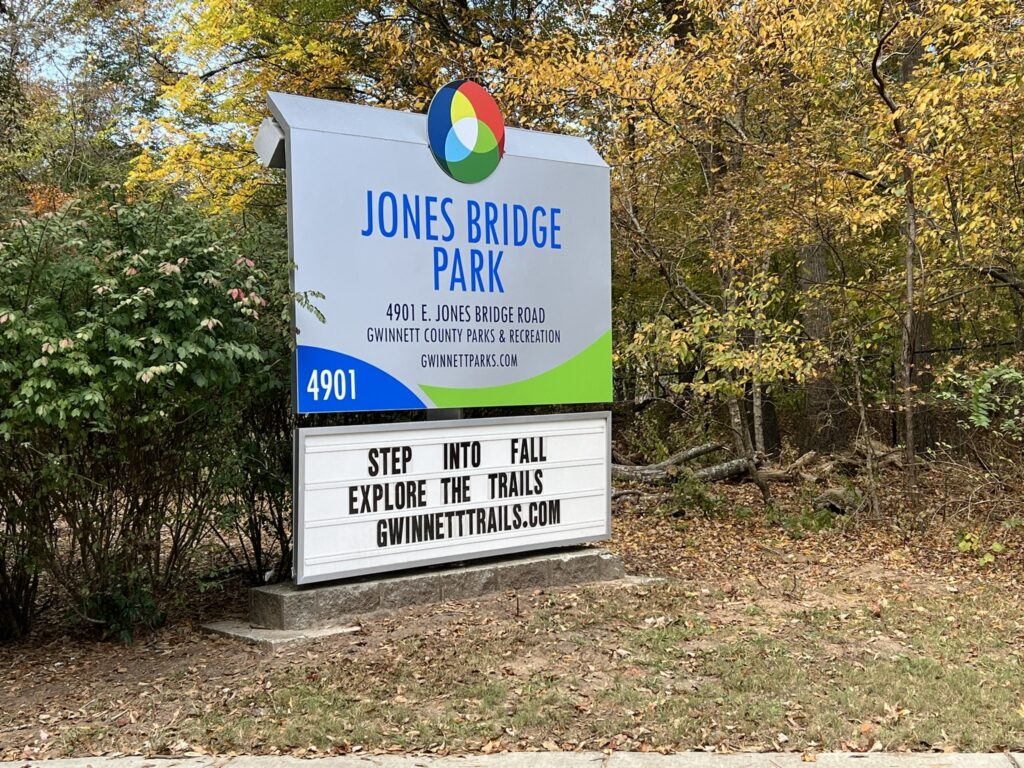
She added that Gwinnett DOT collaborated with the school district about placing parking deterrents on the street leading to the park.
“It’s technically Gwinnett County and Board of Education property where we decided to do the no parking,” she said. “We wanted to make sure that it didn’t impact the school.”
Gwinnett DOT is also looking to redo the pedestrian bridge on East Jones Bridge, with groundbreaking set for this spring.
“That will not impact any traffic — everything should be done fairly quickly,” Goalen said.
Crime, safety and communication
Major J.D. Griffin, west precinct commander for Gwinnett County Police, emphasized the department’s mission to improve community quality of life, but he noted that no one has contacted him about specific concerns despite multiple meetings.
“I hope that means that things are going well, but if not, make sure you if have any specific concerns or anything going on that you feel is not getting addressed that you reach out,” he said.
Major Griffin noted that from October 15 (the date of the last meeting) to January 7, there were 105 area checks, one arrest for drug possession and a few citations for people in the park after hours.
Christina Wagner, a nearby resident, pointed out that there were three-and-a-half-hours of fireworks going on in Jones Bridge Park on New Year’s Eve, despite park rules against it.
“I’m not sure if the flock cameras are working … because it obviously didn’t catch these people and [police didn’t] bother to drive through,” she said.
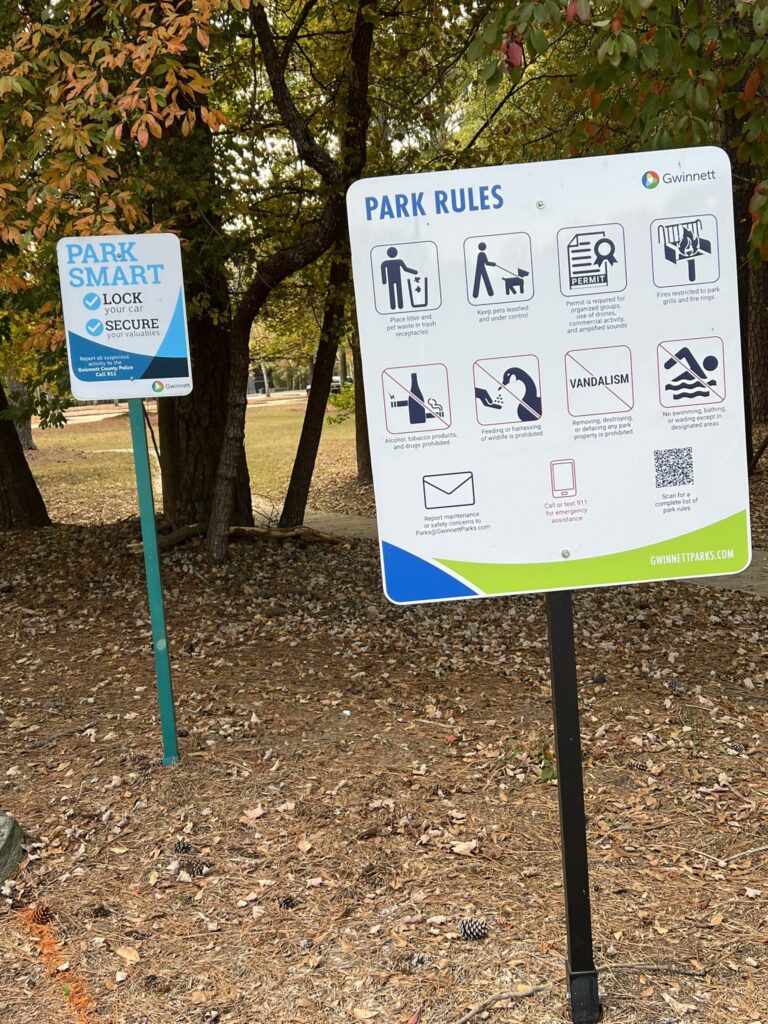
Major Griffin asked if she placed a call to the county police. She hadn’t.
“I just waited. I just wanted to clock and see how long the fireworks would go off without anyone doing anything,” she said.
Major Griffin emphasized that the cameras are license plate readers. They are in place to log activity in the event that there’s a complaint and/or an incident and are not effective in capturing such activities.
That led to the discussion of the need for better crime deterrent technology in the park.
Peachtree Corners Chief City Marshal Edward Restrepo weighed in.
“We’ve all thrown out some technology ideas over the last several months — just basically trying to see what’s palatable for everyone involved,” he said. “From the city standpoint, we’re willing to add whatever technology we feel will help supplement the flock cameras.”
Once the weather gets warmer, the plans for increased law enforcement presence will show if they’re effective.
Future meetings
Peachtree Corners Vice Mayor, Weare Gratwick, suggested the next meeting take place prior to Memorial Day to see how the process is going and to discuss any additional concerns before the unofficial start of summer.
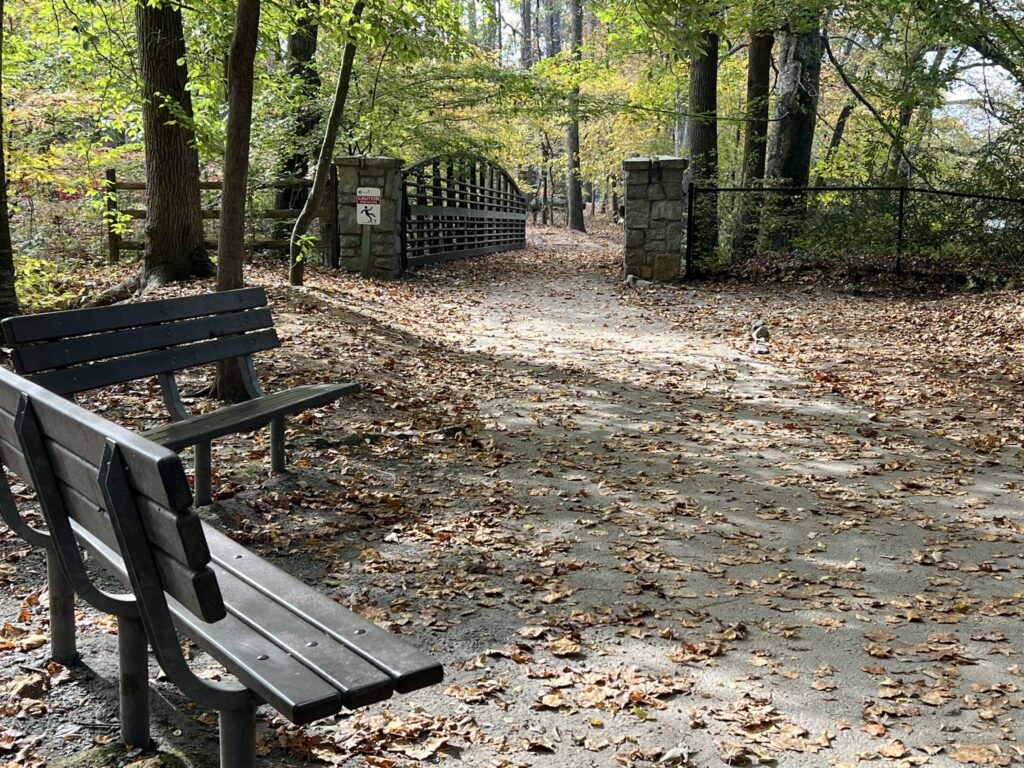
Everyone agreed, but Major Griffin asked to go one better. He suggested that there be a quarterly meeting to address community concerns and updates on park issues. Others asked that the time be more convenient for people who work during the day.
With that, the group agreed on the third Thursday of each quarter at 6:30 p.m. as the meeting start time.
The next scheduled meeting will be on May 15, with Gwinnett County Parks and Recreation in attendance.
Related
Read the Digital Edition
Subscribe
Keep Up With Peachtree Corners News
Join our mailing list to receive the latest news and updates from our team.
You have Successfully Subscribed!

Peachtree Corners Hosts Discussion About the Future of Local Policing

MomoCon 2025 to bring 60,000 Fans to Atlanta for a Weekend of Cosplay, Animation, Gaming and Music

D1 Training Brings New Fitness Concept to Peachtree Corners

Atlanta’s Dog Howl-O-Ween Festival Moving to Peachtree Corners for 2025

From Boardrooms to the Himalayas: Vandana’s Journey to Purpose and Growing with Intention [Podcast]

Local Special Olympics Pickleball Team Honored with State House Resolution

Brandon Branham Honored for Transformative Leadership in Peachtree Corners

Music Matters Productions Expands Peachtree Corners Headquarters

Celebration and Community: ICAGeorgia Wraps Up School Year with Two Festive Events

Guardians of the Jukebox to Play the VoxStage on May 31

Music Matters Productions Expands Peachtree Corners Headquarters

Brandon Branham Honored for Transformative Leadership in Peachtree Corners

From Boardrooms to the Himalayas: Vandana’s Journey to Purpose and Growing with Intention [Podcast]

MomoCon 2025 to bring 60,000 Fans to Atlanta for a Weekend of Cosplay, Animation, Gaming and Music

Local Special Olympics Pickleball Team Honored with State House Resolution

Atlanta’s Dog Howl-O-Ween Festival Moving to Peachtree Corners for 2025

Light up the Corners [Video]

Capitalist Sage: Business Leadership in Your Community [Podcast]

Cliff Bramble: A Culinary Adventure through Italy

Top 10 Brunch Places in Gwinnett County

A Hunger for Hospitality

THE CORNERS EPISODE 3 – BLAXICAN PART 1

Top 10 Indoor Things To Do This Winter

The ED Hour: What it takes to Remove Barriers from Education









